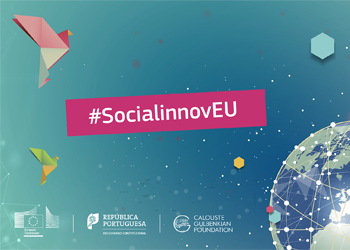New Perspectives on Social Innovation

One of the strategic priorities of the Calouste Gulbenkian Foundation constitutes the theme of the major conference that brings together social entrepreneurs, representatives of civil society, regional and national decision makers, philanthropists, risk capital investors and business angels on 27 and 28 November. A joint event with the European Commission, the Portuguese government and the Calouste Gulbenkian Foundation to discuss the future of social innovation in Europe.
Carlos Moedas, European commissioner for Research, Science and Innovation, Marianne Thyssen, European Commissioner for Employment, Social Affairs, Competences and Labour Mobility, Maria Manuel Leitão Marques, Minister to the Presidency and the Administrative Modernisation of Portugal, and Isabel Mota, President of the Calouste Gulbenkian Foundation Gulbenkian are the keynote speakers at this international event that, over 27 and 28 November, plans to boost social innovation in Europe as an efficient and effective way of fostering inclusive and wealth creating public policies.
The New Perspectives on Social Innovation conference shall provide an overview of where social innovation stands today, analyse new trends in the field, identify future opportunities in terms of not only social wellbeing but also growth, employment and business opportunities for a Europe seeking to foster the setting up of networks between innovators, the business community and other creators of value, evaluating the role of social innovation in the next generation of public policies while also analysing the various available means of financing.
In parallel with the main program, in which social entrepreneurs, representatives of civil society, regional and national decision makers, philanthropists, risk capital investors and business angels, among other specialists, participate, there is also the presentation of projects and initiatives in the social innovation field with practical workshops. The opening of this event, on the 27th, shall see the launch of the Social Innovation Horizon 2020 Award launched, with a value of two million euros, focused on the most appropriate solutions for Improving the Mobility of Elderly Persons.
New and better responses
The launch of the Calouste Gulbenkian Foundation Travelling Library, in the late 1950s, represents a paradigmatic example of social innovation even when the concept still lacked a name. This was a highly disruptive project at the time of its launch in seeking to respond to basic education needs and foster reading habits.
Innovation normally gets perceived as bound up with science and technology, fields in which the impacts of innovation reflect in the development of the new technologies, products and services so highly valued by contemporary societies. However, innovation also takes place in the social domain. Such projects, seen as utopian at the time of their launch, are today a given fact due to their impact on improving the quality of life of people.
Nevertheless, just what is “social innovation”? Today and for always, social innovation happens whenever there is a new and better response to a specific and thus far unsatisfied social need. Its recent conceptualization serves only to recognise the importance of supporting and nurturing this approach to the resolution of social challenges. Due to its capacity to take on risks and deploy resources, the Calouste Gulbenkian Foundation has always attributed a priority role to fostering social innovation and that has correspondingly ranked among its core strategies.
The Orquestra Geração, Fruta Feia, Academia de Código and Ópera na Prisão are some of the most emblematic projects already supported by the Foundation. Exploring the role of technology in the resolution of social problems (e.g. Hack for Good), enhancing the role of the arts in inclusion processes (e.g. the PARTIS program), attracting talent and nurturing new leaders in the social sector, and as well as testing out new forms of financing (e.g. Laboratory of Social Investment) at this moment stand out among the Foundation’s priorities with support rendered throughout the pilot and initial development phases before then promoting their sustainability and scaling-up as well as influencing public policies.
